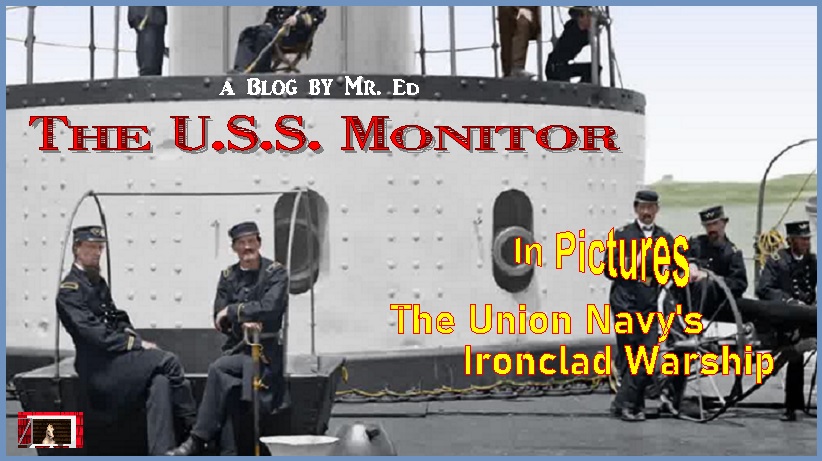
From Wikipedia ~
USS Monitor was an iron-hulled steam-powered ironclad warship built for the Union Navy (United States Navy) during the American Civil War (1861–1865), the first such ship commissioned by the Navy. Monitor played a central role in the Battle of Hampton Roads on 9 March 1862, where, under the command of Lieutenant John L. Worden, she fought the casemate ironclad CSS Virginia (built on the hull of the scuttled steam frigate USS Merrimack) to a standstill. The unique design of the ship, distinguished by its revolving turret which was designed by American inventor Theodore Timby, was quickly duplicated and established the monitor class and type of armored steam-powered warship built for the American Navy in the next several decades.
The remainder of the ship was designed by the Swedish-born engineer and inventor John Ericsson, and hurriedly built in Brooklyn, New York on the East River beginning in late 1861 in only 101 days. Monitor presented a new concept in ship design and employed a variety of new inventions and innovations in ship building that caught the attention of the world. The impetus to build Monitor was prompted by the news that the Confederates were building an iron-plated armored vessel, named the Virginia, in the old Federal naval shipyard at Gosport, near Norfolk, that could effectively engage the Union ships blockading Hampton Roads harbor and the James River leading northwest to Richmond (capital of the Confederacy), and ultimately advance on Washington, D.C. up the Potomac River and other seacoast cities, virtually unchallenged. Before Monitor could reach Hampton Roads, the Confederate ironclad had already destroyed the sail frigates USS Cumberland and USS Congress and had run the steam frigate USS Minnesota aground. That night Monitor arrived and the following morning, just as Virginia set to finish off Minnesota and St. Lawrence on the second day, the new Union ironclad confronted the Confederate ship, preventing her from wreaking further destruction on the wooden Union ships. A four-hour battle ensued, both ships pounding the other with close-range cannon fire, although neither ship could destroy or seriously damage the other. This was the first-ever battle fought between armored warships and marked a turning point in naval warfare.
After the Confederates were forced to scuttle and destroy Virginia as they withdrew in early May 1862 from Norfolk and its naval shipyard, Monitor sailed up the James River to support the Union Army during the Peninsula Campaign under General-in-Chief George B. McClellan. The ship participated in the Battle of Drewry's Bluff later that month and remained in the area giving support to General McClellan's forces on land until she was ordered to join the Union Navy blockaders off North Carolina in December. On her way there she foundered while under tow, during a storm off Cape Hatteras on the last day of the year. Monitor's wreck was discovered in 1973 and has been partially salvaged. Her guns, gun turret, engine and other relics are on display at the Mariners' Museum in Newport News, Virginia, just a mile from the site of its most important military action.
Ship Stats ~
Location: 35°0'7.02"N, 75°24'22.79W (35.00195 -75.40633)
Depth: 240 feet
Vessel Type: Ironclad
Length: 173 feet Breadth: 41 feet 6 inches
Gross Tonnage: 987
Built: 1862, John Ericsson at Continental Ironworks in Greenpoint, Brooklyn, N.Y.
Hull Number: N/A
Port of Registry: USA Owner: U.S. Navy
Lloyd's Register Details: N/A
Former Names: N/A
Date Lost: December 31, 1862
Sunk: In a storm off Cape Hatteras, N.C. Survivors: 46 of 62 survived (16 dead)
